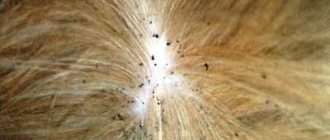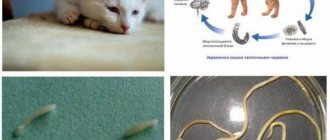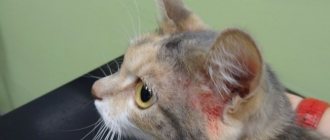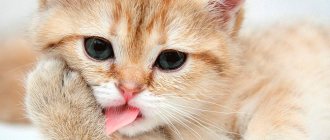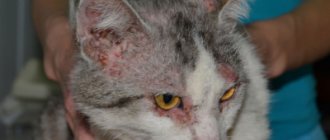- What causes itching in cats and kittens?
- Parasitic infestations Itching in cats and kittens from helminths
- Skin infections
Have you noticed that your cat is itching, but there are no fleas on the skin or fur? Itching can occur due to a wide range of other reasons, often not related to fleas. Sometimes cats develop spots and scratch until they bleed. Unexplained itching may be the result of an illness, so such manifestations should not be ignored.
The best solution is to visit a veterinarian, who will determine the reason why the cat is itching but there are no fleas, and prescribe therapy.
What causes itching in cats and kittens?
Fleas are the root cause of itchy skin in an animal. Even if the parasites were removed earlier, the bite sites may itch for another month, or even a month and a half. First of all, you need to make sure there are no fleas.
Many reasons besides fleas cause itching in a pet. Just like people, cats are affected by diseases that cause itchy skin, for example:
- other types of parasites (possibly helminth worms);
- dermatological skin diseases (lichen);
- skin infections of fungal or bacterial origin;
- scratching is a symptom of problems with the endocrine system;
- inflammatory processes on the skin;
- failure at the hormonal level;
- nervous tension;
- the presence of mites in the animal’s fur;
- allergic manifestations;
- psychogenic factors.
The list is not exhaustive. A cat may constantly itch due to the coincidence of several secondary factors, which are almost impossible to identify on your own.
Diagnostics
Apart from the most pronounced and obvious cases (a dirty animal with fleas and mats in its fur), only an experienced veterinarian can determine the reason why a cat is itching. He will examine the four-legged patient, send him for blood, urine and stool tests, and also take a scraping from the affected area of skin to identify the pathogen.
After receiving the diagnosis, the veterinarian will prescribe treatment and prescribe medications. Mostly, the treatment is outpatient, and only in extremely difficult situations will the cat be left in the clinic for several days.
Parasitic infestations
Fleas are not the only parasites that live on the skin and fur of a pet. If your cat is constantly itching and acting restless, then it is worth checking him for the presence of the following types of insects:
- Ticks. Causes notoedrosis, sarcoptic mange and ear scabies;
- Vlaseaters. Common ectoparasites that live in animal fur and feed on the epidermal cells of a pet;
- Helminths. Unlike external parasites, tapeworms live inside the cat's body. They cause severe itching of the skin all over the body, indigestion, deterioration of stool, sour eyes, sudden changes in the habits and behavior of the pet.
Parasitic infestations are treated after prior consultation with a veterinarian. He will select a suitable drug, used topically (against parasites on the skin and fur) or internally (against worms).
Treatment for ticks, lice eaters, and fleas involves the use of special products: drops, sprays, shampoos. The medications will not only help remove fleas and other parasites, but will also relieve itching.
Treatment for skin insects is simple, but systematic. Don't forget about prevention. Products are used in the form of ointments, gels, sprays, shampoos or drops. They are designed to destroy itching pathogens.
Itching in cats and kittens from helminths
Worms are disruptions in the digestive system, loss of vitamins and nutrients under the influence of the parasitic environment inside the body. Due to the lack of important components, the animal’s skin suffers, it dries out, and severe itching occurs.
Helminthiasis causes intoxication of the body, allergies appear and, as a result, skin rashes and itching. Given the cat's fur, the rashes are not easy to see. First of all, it is important to exclude the presence of worms in pets. After all, even to a newborn kitten they can be transmitted from the mother.
There are types of worms that can easily enter the body through the bites of blood-sucking insects (fleas).
Helminthiasis must be treated without fail, because it is not only external itching, but also a detrimental effect on the body. The development of small kittens does not proceed properly if parasites have settled inside. In cats, worms provoke miscarriage or premature birth.
Treatment and prevention are carried out for all residents of the house, because this disease is easily transmitted. More often, the veterinarian prescribes the following drugs: Drontal, Pyrantel, Febtal, Trontsil K, Polyvercan.
Before starting treatment, it is necessary to undergo tests and determine the type of parasite so that the treatment is effective and not so harsh on the animal’s body.
Infection with helminths as a cause of itching
Helminth
Helminths, if not regularly combated, can significantly annoy your pet, undermining its health from the inside.
The consequences of the vital activity and reproduction of worms in a cat’s body can be many troubles that bring suffering to your pet no less than fleas:
- The cat feels discomfort in the anus, itches and licks it;
- her stool and digestion are disrupted, her appetite is distorted;
- the coat becomes dull and the skin becomes dry and flaky;
- eyes turn sour;
- behavior becomes abnormal: apathetic or, on the contrary, excited.
Even the smallest kitten can suffer from worms if it is infected from its mother.
To prevent infection with worms, regularly clean with anti-helminth medications.
Dermatological skin diseases in cats
Itching does not occur without a reason. When trying to establish a diagnosis, it is important to remember such phenomena as dermatomycosis, caused by all kinds of fungi (molds or yeasts). Most often they appear against the background of weakened immunity of the animal or exhaustion. In such cases, even deaths are possible.
Dermatological diseases of the skin of cats have not been sufficiently studied; the most common is considered to be ringworm or trichophytosis.
Symptoms of the disease:
- hair loss in affected areas;
- peeling skin and severe itching.
This type of lichen can be transmitted by flea bites, so infection from a sick animal is a matter of time and the state of the immune system. Children whose bodies do not yet know how to fight such diseases are at risk.
According to veterinarians, cats of any breed can be susceptible to ringworm, but Persian cats are most prone to it.
If a domestic cat has spots without hair with clearly defined edges, then you need to urgently seek help from a clinic. Specialists using microscopic examination will determine the nature of the fungus and prescribe therapy.
Typically, drugs belonging to the Griseofulvinum group, vaccination and local treatment with antifungal agents are prescribed.
Skin infections
The cause of itching is a common infection that enters the skin through mechanically damaged areas (scratches, microcracks) or from flea bites. Therefore, foci of inflammation arise that cause itching. The disease is very easy to treat.
Among the frequently prescribed remedies is the external use of sulfur ointment. Also, recently in our country a new imported product began to be used, consisting of black walnut extract, Juglone powder.
The drug is widely used to treat skin diseases in animals in the United States. Its action is bactericidal, antifungal, and immunomodulating in nature.
Treatment with antibiotics is carried out only as prescribed by a veterinarian.
Skin infections of an animal are not contagious to humans, since they are secondary in origin. Often the person himself becomes the root cause of infection in a pet.
Allergies in cats
A common reason why a cat is constantly itching is an allergic reaction. It is formed as a result of several factors. The most famous:
- New food. A cat sometimes develops an allergy to new food or food that it has not previously consumed. The solution to the problem is to eliminate the food allergen from the animal’s diet;
- Medicines. A side effect of certain drugs used to treat diseases, syndromes and pathological conditions in cats is local allergies. In this case, you need to get additional advice from a veterinarian to reduce the negative effects of the medicine on the animal;
- Other allergens. Cats, like people, can suffer from allergies to dust, pollen, shampoo, laundry detergent, air freshener, detergent, and so on.
To prescribe the correct treatment, it is worth establishing the cause of the allergy. This is a task even for a doctor, so contacting a veterinarian is mandatory.
Attempts to eradicate fleas force owners to use all sorts of methods. Flea collars cause allergic reactions in animals due to impregnation with chemical compounds that are supposed to protect the animal from insects. It is imperative to monitor your pet’s behavior during the first use of such a product to avoid harm to health.
You should not be skeptical about malfunctions in the animal’s body. After all, even problems with the endocrine system will cause itching of the skin. Considering the cat's flexibility, scratching appears in the most inaccessible places. If you don’t provide the necessary help to the animal in time, it will die.
There are many reasons why a cat scratches and licks its skin. It is normal for a pet to scratch itself sometimes. And if the animal scratches and licks the area before wounds appear, you should immediately contact a veterinarian to avoid irreversible consequences for the health of your furry friend.
Of course, scratching and licking fur is normal for cats. But you should pay attention to the frequency and intensity of how your pet does this. You cannot miss the emergence of a problem, so as not to subject your pet to unnecessary suffering.
Inflammatory processes that cause cats to itch
An obvious pathological factor that provokes constant itching of the skin in an animal is an active inflammatory process. It can be both local and systemic. The most well-known diseases in cats accompanied by an inflammatory process:
- Otitis. If this disease is present, the cat constantly scratches its ears and is very irritable because it suffers from severe pain. The solution to the problem will be the use of drugs that reduce the intensity of the inflammatory process in the designated location;
- Pyoderma. Pyoderma in animals is manifested by purulent inflammation of the skin provoked by coccal bacteria. The cat's epithelium is deeply affected and cannot be treated with local remedies: antibacterial therapy is required under the mandatory supervision of a veterinarian;
- Secondary bacterial infections. They occur after insufficient aseptic treatment of wounds, cuts, and surgical sutures. Treated with broad spectrum antibiotics.
Acne classification
When classified by age group, there are mainly two types of acne:
- In newborns and young children. The belief that acne only affects teenagers and adults is wrong. Infants, children of preschool and early school age, although not often, also suffer from acne. Newborns face this problem because their mothers transfer hormones to them shortly before birth. Acne also occurs when the stress of childbirth causes the baby's body to release these hormones.
- Teenagers and adults. Acne affects 80% of people aged 11 to 30 years. Usually occur during pubertal changes in hormonal levels. Increased production of sex hormones during puberty makes the sebaceous glands more active.
Table - Classification of childhood acne by age
| Form | Child's age |
| Neonatal | from birth to 6 weeks |
| Infantile (early childhood) | from 6 weeks to 12 months |
| Middle childhood | from one to 7 years |
| Pre-adolescent | from 7 to 12 years (for girls before menarche) |
Neonatal acne develops during a period of hormonal changes. In all forms of acne, additional provoking exogenous factors play a significant role.
Fungal infections in cats and kittens
If the cat is constantly itching, is aggressive, eats poorly and is depressed, then the cause of this behavior may be a fungal infection of the skin. The following pathologies are more common in animals:
- Lichen. The term is used for several types of fungal infections. Microsporosis is most often diagnosed in cats. Ringworm is quickly transmitted from animal to person, therefore, regardless of the circumstances, it requires medical treatment;
- Dermatomycosis. Similar to ringworm. It is transmitted exclusively through cuts and wounds through direct contact with infected skin.
Psychogenic factors
Cat owners underestimate the potential psychogenic causes of itching in an animal. The latter appear during periods of severe stress, for example, in the absence of the possibility of mating. In this case, the pet may not only constantly itch, but also mark its territory, behave aggressively, refuse to eat food, and tear furniture with its claws.
There are several ways to solve the problem:
- Organization of mating;
- Castration of an animal;
- Using special sedatives for cats.
A must read!
Here were listed the main causes of itching that cause a cat to have a terrible desire to scratch. But there are many more reasons! It may well be that your pet licks its fur simply because it wants to scratch. But in any case, you need to monitor his behavior, namely, scratching, scratching and biting his own limbs.
To prevent the itching from returning, you should get rid of the cause rather than treat the symptoms. And for prevention, we recommend that you properly care for your cat and keep your beloved pet’s skin clean.
Hormonal disorders
Systemic pathological processes leading to severe hormonal disorders negatively affect the entire body of a pet. Typical problems:
- Diabetes. A severe endocrine disease caused by relative or absolute insulin deficiency due to a number of reasons. At the present stage of development of veterinary medicine, it cannot be completely cured. A cat with diabetes develops bald patches, a sharp change in body weight (usually upward), the quality of the coat deteriorates, and the elasticity of the skin is lost. It is possible to alleviate the condition of a pet only with a special diet, as well as the use of medications on an ongoing basis;
- Cushing's syndrome. A rare cause of itchy skin observed in older cats. It is an extensive pathological symptom complex that develops against the background of excessive synthesis of hormones produced by the adrenal cortex. Complete relief from the problem is only possible through surgery and in situations where the syndrome is caused by tumors;
- Thyroid gland dysfunction. Depending on the type of pathological process (insufficient or excessive secretion of thyroid hormones), the cat may experience severe itching of the skin, partial or complete baldness, tangled hair, and other external negative symptoms.
Treatment of hormonal disorders in a pet is possible only under the supervision of a veterinarian.
